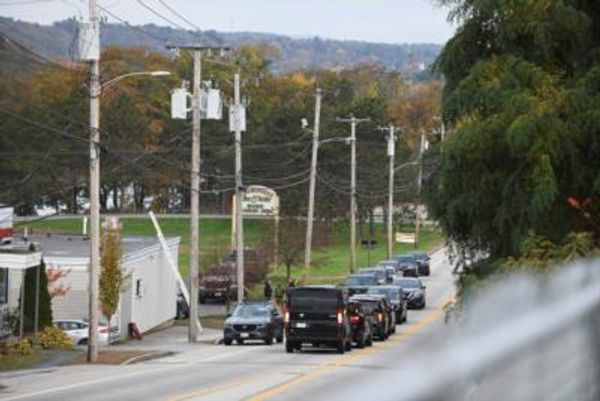
As the Delta variant of coronavirus continues to ravage areas where people did not get vaccinated, the United States hit a six-month high for new cases with over 100,000 infections reported on Wednesday.
The US is reporting more than 94,819 Covid-19 cases on a seven-day average, a five-fold increase in less than a month, Reuters data through Wednesday showed. The seven-day average provides the most accurate picture of how fast cases are rising since some states only report infections once or twice a week.
In the coming weeks, cases could double to 200,000 per day due to the highly contagious Delta variant, said top US infectious disease expert Dr Anthony Fauci.
"If another one comes along that has an equally high capability of transmitting but also is much more severe, then we could really be in trouble," Fauci said in an interview. "People who are not getting vaccinated mistakenly think it's only about them. But it isn't. It's about everybody else, also."
The Delta variant, first detected in India, accounts for 83% of all new cases reported in the United States, as per the Centers for Disease Control and Prevention.
Covid-19 vaccination rates vary widely from a high of 76% of Vermont residents receiving the first dose to a low of 40% in Mississippi, with polls showing Republicans are far less likely than Democrats to get vaccinated.
Unvaccinated people represent nearly 97% of severe cases, according to the White House COVID-19 Response Team.
Deaths, a lagging indicator, jumped 33% over the past week, with about 377 deaths per day on average, according to the analysis.
Southern states, which have some of the nation's lowest vaccination rates, are reporting the most COVID-19 cases and hospitalizations. Florida, Texas and Louisiana were reporting the highest total number of new cases in the region over the last week, according to a Reuters analysis.
Hospitals in Florida and Louisiana are seeing record numbers of COVID patients occupying beds.
President Joe Biden on Tuesday urged Republican leaders in Florida and Texas - home to roughly a third of all new U.S. COVID-19 cases - to follow public health guidelines on the pandemic or "get out of the way".
To try to halt the spread of the virus, New York City will require proof of vaccination at restaurants, gyms and other businesses. Roughly 60% of all New Yorkers have received at least one dose of the COVID-19 vaccine, according to city data. But certain areas, largely poor communities and communities of color, have much lower vaccination rates.
Some private companies are also mandating vaccines for employees and customers.
The U.S. Food and Drug Administration plans to give full approval for the Pfizer COVID vaccine by early September, the New York Times reported on Tuesday, which could prompt more Americans to get the vaccine as it might reduce their fears about the safety of the shot.
Meanwhile, China has imposed new restrictions on travel in a bid to slow a delta-driven outbreak that’s grown to more than 500 cases scattered across half the country, as the government stuck to an aggressive containment playbook rather than rely on its high vaccination rate.
Public transport and taxi services were curtailed in 144 of the worst-hit areas nationwide, while officials curbed train service and subway usage in Beijing, where three new cases were reported Wednesday. Hong Kong re-imposed quarantine on travelers from the mainland, though an exception remained for the southern Guangdong province which neighbors the financial city.
Delta's shadow
Officials reported 94 new local infections on Thursday, including 32 that were asymptomatic, adding to the country’s broadest Covid-19 threat since the pathogen first emerged in Wuhan in late 2019. Though 61% of the population has been vaccinated, one of the highest rates among the world’s biggest countries, China has stuck to its tried-and-true approach of mass testing and targeted lockdowns that’s crushed over 30 previous flareups.
While case numbers are still too low to be a test of whether China’s homegrown vaccines successfully prevent serious illness and death from the delta strain, the government is unwilling to take the chance.
The capital city of Beijing, where officials have worked diligently to keep the pathogen out, halted the use of community spaces for entertainment, limited the number of visitors allowed at parks and scenic areas and implemented a two week quarantine for visitors from high-risk areas. Local officials, meanwhile, are exhorting the population to endure the disruption.
“Vaccination is not equal to entering a safe or carrying a talisman," said Qi Jinli, the deputy director of Beijing’s Covid-19 response taskforce on Wednesday. “Personal protective measures still cannot be relaxed and vaccination cannot replace containment measures. Let’s hold on until we score the ultimate victory against the the outbreak."
China’s uncompromising approach is increasingly an outlier as major western economies turn to vaccination to keep hospitalizations and fatalities low amid resurgent outbreaks. Even other places that have stamped out the virus, like Singapore, say they are pivoting to treating Covid-19 as a persistent, endemic condition.
The Chinese vaccine-makers have not released data from broad-based studies on how well their shots perform against the delta strain, but experts say their effectiveness -- already lower than the western messenger RNA vaccines -- will be even less potent against the highly infectious variant.
“The problem for China is that its vaccines are likely to lose more effectiveness against the delta variant," said Sam Fazeli, an analyst at Bloomberg Intelligence. “This means that to contain the delta variant, China would have to use more lockdowns, which will have broader economic consequences."
In just two weeks, confirmed cases -- people infected and sickened by the virus -- have grown to more than 500. The infections can be traced back to three clusters in China: an outbreak among airport cleaning staff in the eastern city Nanjing, another at a hospital treating Covid patients in Zhengzhou and sporadic cases detected in Yunnan, the province bordering Myanmar.
Delta has spread to Wuhan, which has been virus-free since China contained the initial outbreak there early last year. The city has detected 12 cases as of Aug. 3 and is currently testing its entire population of 12 million people.
Chinese authorities urged people to cancel business trips and vacations, while some colleges around the country have asked students, especially those from high-risk areas, to delay their return to school for the new semester.






